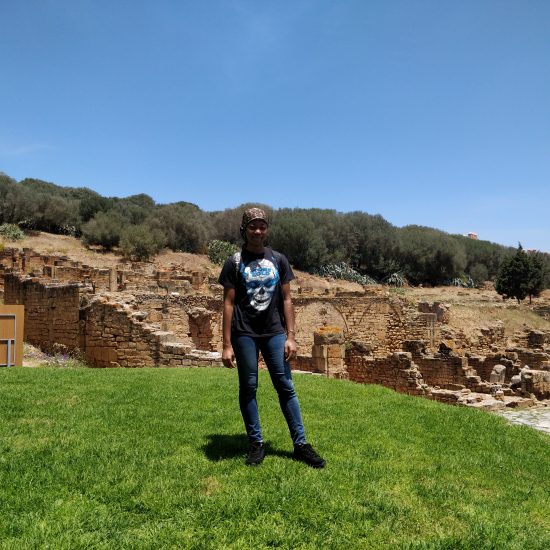Destiny Akagha

OEA Scholarship Recipient
Senior
DESTINY’S EXPERIENCE ABROAD
Why did you choose the location you studied abroad in?
“I chose Morocco because I have always been interested in northern Africa; and being that I originate from the Sahel portion of the continent, I have always wondered how the cultural influences from the north and the sub-Saharan regions interact to form the Sahel’s hybrid nature Additionally, I have been taking French for approximately 8 years, so I wanted to practice my French in a country where French as well as other languages are spoken.”
Describe the types of food that are common in the host city or country.
“Moroccan food is very fresh and healthy. So if you are not used to eating a lot of vegetables, fruits, and home-cooked meals, living with a host family will be quite difficult. For those who like eating out, the city has various fast food restaurants and dining. The types of food you find really depends on when you visit the country. I traveled there during Ramadan, so many of the foods I ate during that period are not normally served year-round. Because of the heavy French influence in the country, you can find many French cuisine there.”
Describe some of the cultural differences you encountered.
“Moroccan people are very friendly and open. They are used to switching between languages for work and school. In this instance, I think this is where the U.S. culture and the Moroccan culture differ. Here in the U.S. most citizens only speak one language and are not forced into speaking another. Moreover, Moroccans are very blunt. They have their own perceptions of beauty and are sometimes vocal about weight and other physical features. But apart from these things Moroccan culture is all about hospitality and calmness, therefore it is very common to be welcomed by strangers as well as people running on their own time (there is no such thing as “running on the clock” in Morocco).”
Describe the academic environment abroad.
“All of my professors were very nice and flexible. They really wanted us to appreciate the Moroccan culture, so they often accompanied us on many excursions. The classes were mainly based on participation and had a lecture/discussion set-up. Honestly speaking, I enjoyed both the Moroccan studies class and the Darija class. With regards to the Moroccan studies class, students should be very prepared for discussions without any power-points. Moroccan professors just usually talk and write a couple of trigger words on the board. Also, be prepared to do a lot of reading outside of class!”
What part of your experience made the greatest impact on you?
“The part of my experience that had the most impact for me was being able to experience different ways of learning, living, and believing. I gained so much maturity from this experience. If I could do it again, I would. Traveling abroad makes you realize how big and beautiful this world is. It also makes you appreciate what you have.”
In your opinion, why should students study abroad?
“I think students should study abroad because of how increasingly interconnected the world is becoming. It is really important to know what is going on in other parts of the world because one way or another it has an impact on you whether you like it or not. Seeing education in a different light can help students develop a deeper appreciation for American schooling. Also, being able to experience different ways of handling a situation is imperative when looking to further one’s professional and academic goals.”